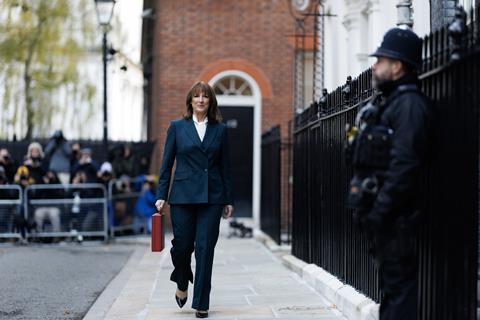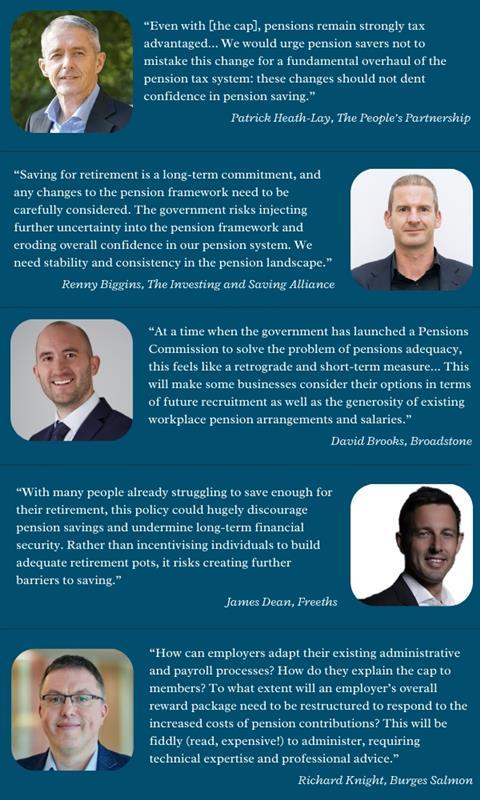Salary sacrifice on pensions is to be capped at £2,000 from April 2029, causing widespread ire from the retirement industry.
First revealed in a pre-speech leak from the Office for Budget Responsibility (OBR), salary-sacrificed pension contributions above an annual £2,000 threshold will no longer be exempt from national insurance (NI).
Any pension contributions exceeding the £2,000 level will therefore attract both employee and employer NI. It is forecast that this change will raise £4.7bn in the 2029-30 financial year, and £2.6bn in 2030-31.
“Restricting salary sacrifice for pensions will affect the take-home pay of millions of employees – especially basic rate taxpayers – and is a tax on working people, in spirit if not in name.”
Steve Hitchiner, SPP
In her speech, the chancellor claimed that higher-rate taxpayers were the main beneficiaries of salary sacrifice arrangements, and called the cap a “pragmatic step”.
According to the Society of Pension Professionals (SPP), around a third of private sector employees make use of salary sacrifice arrangements, with almost 10% of public sector workers doing so.
In recent weeks, it has been heavily rumoured that the chancellor would cut salary sacrifice, but the announcement has nonetheless been criticised by many in the pensions industry.

“Restricting salary sacrifice for pensions will affect the take-home pay of millions of employees – especially basic rate taxpayers – and is a tax on working people, in spirit if not in name,” said Steve Hitchiner, chair of the tax group at the SPP. “It is also another sizeable cost to employers and, perhaps most importantly, its restriction will reduce pension saving.”
Lou Davey, head of policy and external affairs at Independence Governance Group, said the move had “pulled the rug” from under the millions of savers who use salary sacrifice to boost their pension pots.
“The clear message from industry ahead of the Budget was to give us stability to not risk undermining saver confidence,” added Lou. “The government has a clear desire for the pensions sector to help drive growth, but this move is counterintuitive by limiting the ability of pension funds to invest in UK assets and encouraging savers to make decisions they might regret in retirement.”
“This will directly hit the wallets of working people and undermine the incentive to save more for retirement at a time when we already face a crisis in pension adequacy.”
Brian Byrnes, Moneybox
Pensions UK: Cap will harm economy, companies and pensions

Zoe Alexander, executive director of policy and advocacy at Pensions UK, said: “Over half of savers are on course to fall short of the retirement income targets set by the 2005 Pensions Commission. Applying national insurance to salary-sacrificed pension arrangements above £2,000 will harm the economy, businesses and pension saving.
“In a recent survey of Pensions UK members, 75% of respondents said they believe savers are likely or very likely to alter retirement contributions or decisions as a result of the changes. More, not less, pension saving is needed if everyone is to have an adequate income in retirement.
“However, applying the changes from 2029 should at least give businesses time to prepare and we urge them to consider how they can maintain the generosity of their workplace pension arrangements to lessen the harm to savers’ retirement prospects.”
‘Contradictory message’ from government
Despite Rachel Reeves’ comments, many have pointed out that this change is more likely to impact those within the basic taxpayer bracket than more affluent savers. This is because the main rate of NI contributions is 8% for employees, but only 2% on income above £50,270.
“The chancellor’s decision to cut pension salary sacrifice will directly hit the wallets of working people and undermine the incentive to save more for retirement at a time when we already face a crisis in pension adequacy,” said Brian Byrnes, head of personal finance at Moneybox.
“By making pension saving less attractive, future generations will not only bear the cost of supporting the over 14 million people already under saving, but also the many others negatively affected by this cut to salary sacrifice.”
In agreement is Martin McFall, partner in pensions at Trowers & Hamlins, who assessed the change from the perspective of the government’s aim to reduce the attractiveness of salary sacrifice as a way of changing saver behaviour.
“It does seem at odds with other aspects of the government’s own pension policy, which seek to drive value-for-money solutions to achieve improved pensions outcomes,” said McFall. “To that degree, imposing limits on NI savings stymies that behaviour and sends out a contradictory message.
“Spare a thought, too, for those employees whose earnings are hovering around the increased minimum wage. For them, it’s no sacrifice, it’s no sacrifice at all.”
A ‘retrograde’ step or ‘least worst outcome’? Industry reacts to salary sacrifice cap



























